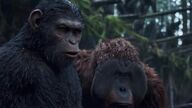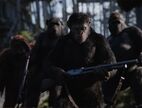First you have to know, not fear, know that someday you're gonna die.
We are going to die one day.
--------------------------------------------- The following contains spoilers ---------------------------------------------
The "Rise of the Planet of the Apes" series that began in 2011 is a remake (reboot) of the 4th and 5th part of the series that began in 1968. In this work (the third part), it tells the story of Caesar, after killing the traitor Koba of the orangutan tribe in the second part, when he was about to migrate, but the whole tribe was put into the cage of the lieutenant colonel, and the orangutans tried their best to escape.
Plot:
The main line of the story is divided into two sections. The first section is about the pursuit. After the apes were attacked by the lieutenant colonel twice, Caesar lost his wife and eldest son. In order to protect the migration of the tribe and the revenge of the Caesar Benedict, Caesar launched a continuous pursuit of the lieutenant colonel, until he caught up with the lieutenant colonel at the border, but was caught in a cage.
The second section is about escape. Caesar’s arrest did not declare the annihilation of the whole army of the orangutans. Morris and other orangutans lurked outside the border camp when they followed Caesar. Successfully escaped the night before confronting the headquarters forces. Caesar stayed in the camp alone and used a grenade and two oil trucks to blow up all the lieutenant colonel forces, triggering an avalanche and burying the headquarters forces alive. The orangutan family finally succeeded in the migration, and at this time Caesar finally passed away.
After reading some comments, the doubts about the plot are mainly focused on "Why does Caesar have to hunt down the colonel?" If this question is directly answered from the text of the film, you should get something like: "Caesar was influenced by Koba", or " Caesar was vengeful, he was an impulsive gorilla". But the real answer to this question is that Caesar subconsciously realized that in order to truly protect the orangutan clan, he had to kill all the soldiers like the lieutenant colonel—even if they gave their lives... even if they paid more. If you look at a small group of just a few hundred orangutans, Caesar's behavior does seem reckless and willful. He (on the surface) chose revenge, but let's think about it, even if Caesar and his clan were really lucky not to be met by the lieutenant colonel on the way to their migration, and managed to reach that new home, how long would they live? It was on this mission that Caesar (whether he realized it or not) set out to "revenge." Judging from the lines, he said that this will "create opportunities for you to migrate", but the truth is that if he doesn't go, his ethnic group really has no chance.
Persona:
The traitor among the gorillas is the rest of Koba. This is very interesting. When Koba died, Yubu was afraid of being suppressed by Caesar and excluded from the group, so he took the initiative to defect and join the human race. However, the "gorilla" (called Donkey in the film) obviously cannot integrate into the human beings equally, and they become lackeys and minions. Humans fight, Donkey hands guns, humans keep orangutans in captivity as slaves, Donkey acts as overseer, whipping their fellows... All of these are actually based on the history of human slaves-maybe mainly aimed at black slaves in the United States, after all, I have not seen them in the military With a black man - modeled on it. So when Caesar walked up to the chimp who was being punished and yelled "Leave him!" I had to see Caesar's image side by side with those great leaders.
The lieutenant colonel forces are undoubtedly Nazi symbols in the film - slogans, leaders, flags (symbols), ethnic cleansing (including the aphasia of Nova and the orangutans)... But this does not mean that the headquarters forces are good people, in the film Only one shot was given to illustrate the point - the victory over the Lieutenant Colonel's headquarters army, with the gun raised in the face of the unarmed Caesar. Although the avalanche forced them to put down their guns and start running away in the next second, such an action was enough to show the director's attitude towards them - you are not a good thing, let's die together.
Speaking of which, I have to mention the two new recruits that Caesar recruited on the way to pursue the lieutenant colonel: Nova and Bad Ape;
The word Nova means new star, which represents a new direction of human evolution in the world view of this film. Nova was originally a human. After contracting the mutated gorilla flu, he became aphasia (but his intelligence was not significantly degraded). Based on this, the Colonel believed that the Nova family (let's call aphasia like Nova the Nova family) would cause all humans to degenerate and return to normal. Ancestors, thus isolating and killing them from human beings, also killing their relatives and friends, burning items that might carry the mutated chimpanzee flu virus... All this, on the one hand, can be regarded as the germination of Nazism in the mind of the lieutenant colonel, on the other hand On the one hand, it means that the forces of evolution are being thwarted (maybe I am over-interpreting it, but I still have to talk about it). In the 1968 version of the old "Planet of the Apes" series, humans infected with this virus eventually became low-IQ atavists, the objects of gorilla enslavement. But in this film, firstly, the degeneration did not actually happen (you know it when you look at the little girl Nova), and secondly, Nova lives with the orangutan in the ending, which represents the choice of evolution on the human branch, then they are the human beings in the The next point on the evolutionary tree. If you can accept this understanding, then the director let the lieutenant colonel and the headquarters all die, which actually means that nature chose Nova instead of humans.
Bad Ape hints at the future of the orangutan - Caesar is not unique as a smart orangutan, Bad Ape can do it too, in fact Koba in the second part can also speak, this film also has other orangutans such as Maurice learned to speak ( a few simple words). On this line, it indicates that the orangutans have also evolved as a group. This is also reflected in Caesar's lines at the end. He said that when he died, the orangutans were still very strong, which is what he meant.
caesar. This character is the most important and troublesome in the story. Because if the above topics such as "Lieutenant Colonel-Nazi", "Nova/Bad Ape-Evolution" need to be presented in a story, it is difficult for Caesar's role to be fulfilled. He needs to take care of the overall situation and carry the plot forward - so he designed the revenge of killing his wife and children for him in terms of motivation, which is dwarfed by people. He has changed from a leader to an avenger. . Although he later returned to the ape family and became the imprisoned leader, the fate of the ape family was out of his control at that time. After Caesar was captured, the protagonist actually became the entire group (as a whole, plus Nova), and the story also changed back to the confrontation between the orangutan and the human, at least the orangutan itself needs to seek escape.
Audiovisual:
My favorite shot of the film is a bird's-eye shot of the opening jungle battle. It was before a unit of the lieutenant colonel marching in the jungle, and the crowded and tense mood was well prepared. Then the battle started, and the camera immediately cut to a bird’s-eye view—a view from which God looked down on the people. This shot arguably sets the tone of the story high from the start, emphasizing that the theme is looking at conflict between races rather than individual (orangutan) conflicts.
The section of the beach, if it is intended to be seen in connection with the second part, in the section of the beach in this section are dusk or early morning, with low light. And the second part is full of bright daylight. This may not have anything to do with the plot, but emotionally lays out a doomsday mood. Although in the later snow scene there is no longer such a meaning.
The snow scene is the main scene in the middle and back sections - I'm a little sleepy writing this, so I'll add it later.
other:
Uncertain information, such as whether Winter represents a certain minority, is there a metaphor for race in this character?
At last:
I used the lines from "Fight Club" as a caption to illustrate that human beings now claim to be the spirit of all things, but eventually they must also be reduced to dust. Maybe human beings will be complacent for a long, long time, but you must know that we will die one day.
View more about War for the Planet of the Apes reviews











